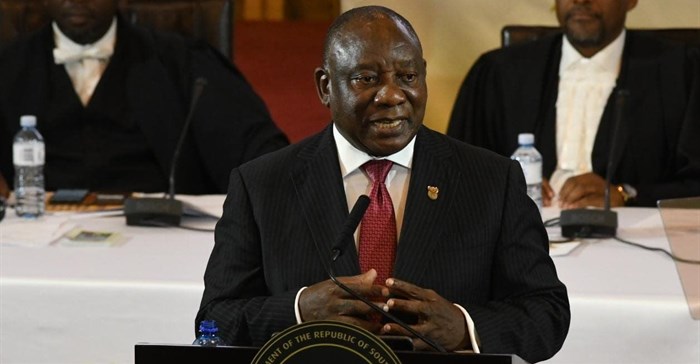In a response echoing the spirit of President Cyril Ramaphosa’s State of the Nation Address (SONA), the South African Institution of Civil Engineering (SAICE) has underscored the necessity for resilience in tackling the challenges confronting South Africa’s economy and infrastructure. While acknowledging the hopeful sentiments expressed by the Ramaphosa-led government, Sekadi Phayane-Shakhane, CEO of SAICE, emphasised the critical role of effective implementation in sparking the changes needed for economic development.

President Cyril Ramaphosa made many commitments in his 2024 Sona
“Comprehensive timelines, defined roles, and accountability are crucial for the reconstruction of South Africa’s infrastructure and economy. We further advocate for an escalation in infrastructure investment, a reduction in underspending, and the improvement of procurement regulations to stimulate sustainable growth,” Phayane-Shakhane stated.
She also found it heartening to observe the emphasis placed on job opportunities and programmes for unemployed youth seeking work. “We applaud companies that are committed to fostering mentorship and creating opportunities for young professionals. The unemployment figures are at an all-time high and require immediate government intervention.”
SAICE approves of the government’s commitment to combating corruption in the country. In this context, SAICE reiterated its call for procurement processes to maintain integrity, ensure accountability, deliver value for money, and remain free from political interference.
“We cannot overstate the importance of decisive measures to enhance state capability and reduce the potential for procurement corruption. Maintaining the status quo risks further obstacles to infrastructure development, particularly within parastatal entities, and the attraction of essential local skills and funding necessary for progress,” declared Andrew Clothier, SAICE’s president for 2024.
Fight against corruption
The industry body welcomed the government’s stance to mitigate corruption in the country. In light of which, SAICE reiterates its call for procurement processes to uphold integrity, be held accountable, provide value for money, and be shielded from political interference.
“We cannot stress the importance of bold steps to enhance state capability and reduce the scope for procurement corruption,” said Clothier. “Perpetuating the status quo risks further hindrance to infrastructure development, particularly within the parastatal entities, and the attraction of vital local skills and funding needed for progress.”
Clothier adds that government needs to follow through on their commitment to overhauling the freight rail system and maritime infrastructure and make good on their promise for increased spending on infrastructure developments, through alternative finance vehicles, such as Build Operate Transfer projects.
Meanwhile, addressing the current energy crisis remains paramount. “SAICE acknowledges efforts made, including private investments, but underscores the urgency for clear mandates and expert involvement in restructuring and reforming entities like Eskom,” says Clothier.
It is encouraging to note that the growth of the renewable energy programme as mentioned in Sona and that greener technologies are taken more seriously
Phayane-Shakhane adds that dysfunctional municipalities and the professionalisation of the State require immediate attention.
“We emphasise the need to reinstate skilled professionals and build human capacity to oversee infrastructure projects effectively. Further, transport infrastructure, particularly rail and road systems, demands accelerated policy implementation to stimulate economic growth.”
Service delivery issues
In light of the various service delivery issues impacting South Africans, particularly the lack of basic services and sanitation, she believes that water supply and maintenance of infrastructure are critical for public health and economic stability.
In particular, SAICE calls for proactive measures to address water system challenges and prioritise maintenance to prevent further deterioration.
“We welcome the establishment of the Climate Change Response Fund given the devastation we have seen across our provinces. However, as SAICE, we continue to urge the government to ensure the effective implementation of the proposed solutions outlined in the SONA.”
“As we navigate the challenges and opportunities, SAICE remains committed to collaborating with all stakeholders to drive positive change and secure a prosperous future for all South Africans,” concludes Phayane-Shakhane.











